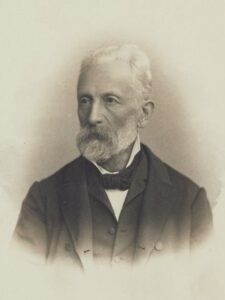
Adolf Bastian (1826–1905) was one of the pioneers of modern anthropology, born June 26, 1826, in Bremen, Germany. This multicultural port city exposed him to many different cultures and customs, eventually igniting his interest in studying different societies. From his father, who belonged to a well-known merchant family, he inherited a strong instinct for business and organization. His education was wide and varied. He attended five different universities, studying law at Heidelberg, biology at Berlin and Jena and also Wurzburg where Rudolf Virchow had just begun to lecture. In 1850 he graduated with a degree in medicine from Prague.
The next year he took a job as ship’s doctor to Australia. He then traveled almost everywhere, with the single object of collecting materials for his project of comparative psychology. His first journey, lasting from 1851 to 1859, led him from Australia across the Pacific to Peru, Mexico, and the West Indies, then back to China, Malaysia, and India, and then by way of West Africa back to Europe. In 1861, he was in Indochina again on a four years’ journey, which covered Malaysia, the Philippines, and Japan, then returned to Germany by way of North China, Central Asia, and the Caucasus with material for six massive volumes.
In Germany, Bastian began lecturing at the University of Berlin, writing detailed accounts of his travels and publishing much of the material he had collected. Between 1865 and 1873, he devoted himself to organizing ethnological studies. He was instrumental in founding a worldwide journal and several anthropological and geographic societies. He also began to house and exhibit his vast collection of cultural artifacts, culminating in his establishing the Berlin Society for Anthropology, Ethnology, and Prehistory, as well as the Berlin Ethnological Museum, to which he donated his collection.
A fourth journey took him to the West Indies and South and Central America. On a fifth journey (1878–1880), he traversed Southern Asia from Persia to Assam and Indochina, then once more to Malaysia, Australia, New Zealand, and across the Pacific again to California and Yucatan. Between 1889 and 1891 he went through Turkestan to India and East Africa, with special enquiry into Jainism and Buddhism. In 1896–1898 he went to look for early Hindu remains in Java and Bali, then again to Ceylon for further Buddhist study. In 1903, at the age of seventy-seven, he set out once more to Malaysia, then to study the earlier history of Jamaica in caves and shell mounds, to Venezuela, and finally to Trinidad where he died almost unattended after a brief illness at Port of Spain.
Bastian published 180 books and manuscripts. His travel writings and descriptions of different indigenous groups were widely read across Europe. His main idea was that of the “psychic unity of mankind”—that human psychology is essentially uniform across all cultures, and that certain fundamental concepts, such as birth, death, family, and religion, were core ideas in all human societies. Though expressed differently across cultures, they formed the fundamental building blocks of all human culture and consciousness and only later evolved into local cultures.
Bastian believed that observed cultural variations were superficial and masked an underlying universal human nature. This ran up against more popular theories that cultures arose independently at different times and in different locations. But his insistence on detailed ethnographic description and his prodigious collecting efforts have greatly contributed to the recognition of anthropology as an academic discipline.
Reference
Edward Tylor. Obituary: Adolf Bastian. Man 5 (1905): 138-43.

Leave a Reply